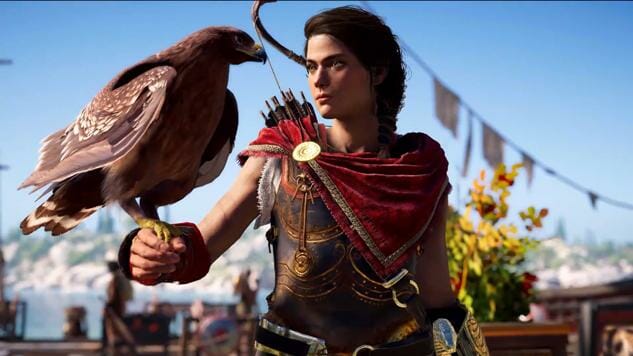Assassin’s Creed Odyssey Wanders Too Far and Wide

There are a handful of videogames that release a new installment every year, and it really doesn’t make sense that Assassin’s Creed is basically one of them. There have been 11 main Assassin’s Creed games since 2007, which puts it only one off the pace of such annual series as Call of Duty or most major sports games. It’s weird to think Assassin’s Creed is in this same category simply because Assassin’s Creed itself is a weird game. Football, baseball and playing army man all have an intrinsic, easily understood appeal that predates and transcends the idea of videogames. Assassin’s Creed’s history-spanning sci-fi saga about rival secret societies feuding over artifacts from a race of otherworldly beings that existed on Earth before humanity is just a little more esoteric a draw than throwing a ball through a hoop.
That convoluted storyline can be broken down into two different eras. For the first five years of the series, Assassin’s Creed was focused on one specific modern day assassin, Desmond Miles, as he used a device called the Animus to relive his ancestors’ memories. The best thing Assassin’s Creed did was kill that guy off. Since 2014’s Assassin’s Creed IV: Black Flag, there’s been less focus on the modern day framing device, with the series spending more time in its recreations of the past while also taking a broader view of the eternal Assassin / Templar war. That maximizes the concept’s strengths—letting us sneak and climb through detailed versions of real life cities from the past while stealthily assassinating targets, and engaging in rhythmic, period-appropriate combat when our cover’s blown. Assassin’s Creed is a postcard game founded on classic conspiracy theories with an incredibly generous serving of murder on the side, and the appeal of that fundamental formula has never gotten old.
Last year’s Assassin’s Creed Origins brought some significant changes to that formula that freshened up the action. It also took place much further in the past than any other game so far, hunkering down in Egypt near the end of the Ptolemaic dynasty, over 1200 years before the original game in the series. Instead of the tight cluster of buildings found in the comparatively advanced cities in other Assassin’s Creed games, Origins was more spaced out, which heavily cut into that parkour-influenced style of motion synonymous with the series. With a revamped combat system that required a different kind of precision, and a greater reliance on RPG systems like skill trees and weapon and armor upgrades, Origins also deepened both the action and RPG elements of these games at the same time.

The brand new Assassin’s Creed Odyssey is set even earlier in history, going all the way back to the Peloponnesian War in Ancient Greece in the 400s BC. It picks up where Origins left off from a mechanical sense, expanding on that game’s changes while also reintroducing some of what Origins had pared back. It smartly builds on the successes of Origins while feeling more in line with the Assassin’s Creed brand, and is a better game than its predecessor.
Odyssey preserves the open world RPG atmosphere of Origins, with a large number of skills, weapons and armor pieces to collect and upgrade. The fighting is practically the same, with the shoulder buttons used for both attacks and defense, and a more active and responsive hand required in combat compared to the paired animation-driven style of the older games. The ancient landscape still sprawls out with large expanses of open land, and the towns you do enter are rarely as large or developed as the post-Dark Ages cities the series used to explore. Without buildings or crowded streets to get lost in, that once again means you’ll spend more time stalking your enemies, both hiding in grass for stealth assassinations and using your trusty eagle to stake out enemy bases in advance.
The naval battles of Black Flag return in full, with much of the game’s action taking place on the water. Lieutenants can be recruited to work on your ship, improving such stats as your boat’s defense or the strength of your archers. Your character also harks back to earlier assassins. You pick one of two Spartans, Kassandra or Alexios, at the start of the game; they’re both super competent mercenaries with a touch of Ezio Auditore’s roguish charm. Like that hero of Asssassin’s Creed II, their devil-may-care attitude leads to an active love life; one of the ways the game expands on its RPG leanings is with multiple dialogue choices, which sometimes result in casual sex with non-playable characters.
